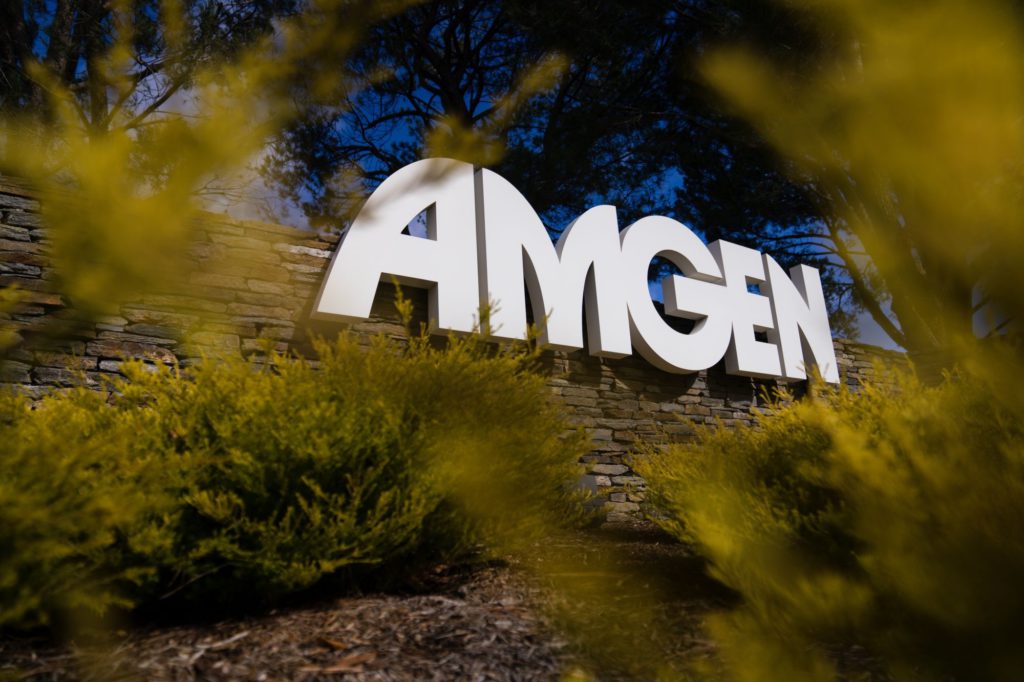Amgen Inc. is challenging one of the world’s best-selling medications with an unusual strategy: charging two list prices for the same medicine.
(Bloomberg) — Amgen Inc. is challenging one of the world’s best-selling medications with an unusual strategy: charging two list prices for the same medicine.
The company on Tuesday launched Amjevita, the first nearly identical version of AbbVie Inc.’s blockbuster anti-inflammatory medicine Humira to reach the US market. Amjevita will cost $85,494 a year, or 5% less than Humira, according to Thousand Oaks, California-based Amgen. It will also be available for 55% less than Humira for some buyers.
Amgen’s dual-track strategy is designed to combat AbbVie’s ferocious protection of its blockbuster drug, which brought in sales of $21 billion in 2021 alone, and the maze of rules and players that are part of the US medical system. The smaller discount is designed to appeal to pharmacy-benefits managers, powerful intermediaries between companies and insurers who typically prefer to pay more upfront in exchange for rebates later on. The larger discount could capture insurers that treat patients directly, who prefer to pay less upfront.
“Given the uniqueness of the US market, we tried to find a unique solution that would work for all of the different stakeholders,” Murdo Gordon, Amgen’s head of global commercial operations, said in an interview.
As the drugs go head to head, their performance will illustrate whether the introduction of so-called biosimilars can curb the cost of expensive medical treatments. Amjevita is nearly identical to Humira, a monoclonal antibody that treats a slew of inflammatory diseases, such as rheumatoid arthritis, plaque psoriasis and ulcerative colitis.
Amgen and AbbVie shares were little changed at the US market open.
Amgen’s drug is the first biosimilar version of Humira to reach the US market after years of legal battles and a patent fortress protecting the drug. Another seven Humira biosimilars are slated to enter the market later in 2023.
Tough Competition
AbbVie is seeking to fend off those new entrants, in part, by courting pharmacy-benefits managers. PBMs play a central role in the success of biosimilars because they influence which drugs millions of Americans have access to. So far, they’re electing to cover biosimilars alongside Humira. The branded drug will remain available on plans representing more than 90% of Americans, AbbVie Chief Executive Officer Richard Gonzalez said at a conference earlier this month.
Even with lower list prices, Amjevita faces hurdles to displace AbbVie’s blockbuster: Humira will remain the preferred drug in commercial plans at CVS Health Corp., which operates the largest PBM, a company representative said Tuesday. The biosimilar will be a non-preferred brand, which will mean CVS clients will be given incentives to stay with Humira for now. The company said the arrangement will “minimize member disruption” as more alternatives to Humira launch in July.
Two other big PBM operators, units of UnitedHealth Group Inc. and Cigna Corp., have said they’ll cover biosimilars in the same way they cover Humira.
The competition is already driving prices down, though it’s impossible to say by how much because the contracts PBMs negotiate with pharmaceutical companies are confidential, Gordon said. It’s also difficult to say exactly who will benefit. PBMs say they pass all rebates along to their customers, namely employers. People taking Amjevita should pay less out of pocket than if they were taking Humira and payment assistance will be available, Gordon said.
Read More: Fortress of 100 Patents Protects the World’s Best-Selling Drug
Amgen is also working to overcome the fact that while Amjevita is almost exactly the same as Humira, there are some differences. Biosimilars are nearly identical to the branded drug, whereas generic drugs are exactly the same as the original. Biologic drugs are harder to replicate than pills because they’re made in living organisms and are large molecules.
Imagine giving two people blueprints to the Empire State Building, said Marcus Snow, a doctor in Nebraska and chair of the American College of Rheumatology’s committee on rheumatologic care. The buildings will be the same though there may be some minor differences, such as door handles or paint colors.
“You’re building the same building, but there are gonna be slight differences,” Snow said. “And because these molecules are so big, you can’t say generic because they’re not 100% exact.”
That may give some doctors and patients pause, especially if someone is responding well to Humira, said Anna Hyde, vice president of advocacy and access at the Arthritis Foundation. Surveys and conversations with patients suggest some people worry they’ll “rock the boat” of their condition.
At this point, many patients aren’t even aware of biosimilars, Snow and Hyde said. “We’re trying to temper expectations,” Hyde said, adding the the rollout is only beginning.
Amgen agrees uptake in the US may be gradual, unlike in countries with a universal health-care system where patients quickly move to the less-expensive drug.
“There isn’t really an analogous market in the rest of the world,” Gordon said.
–With assistance from John Tozzi and John Lauerman.
(Updates shares in sixth paragraph)
More stories like this are available on bloomberg.com
©2023 Bloomberg L.P.










